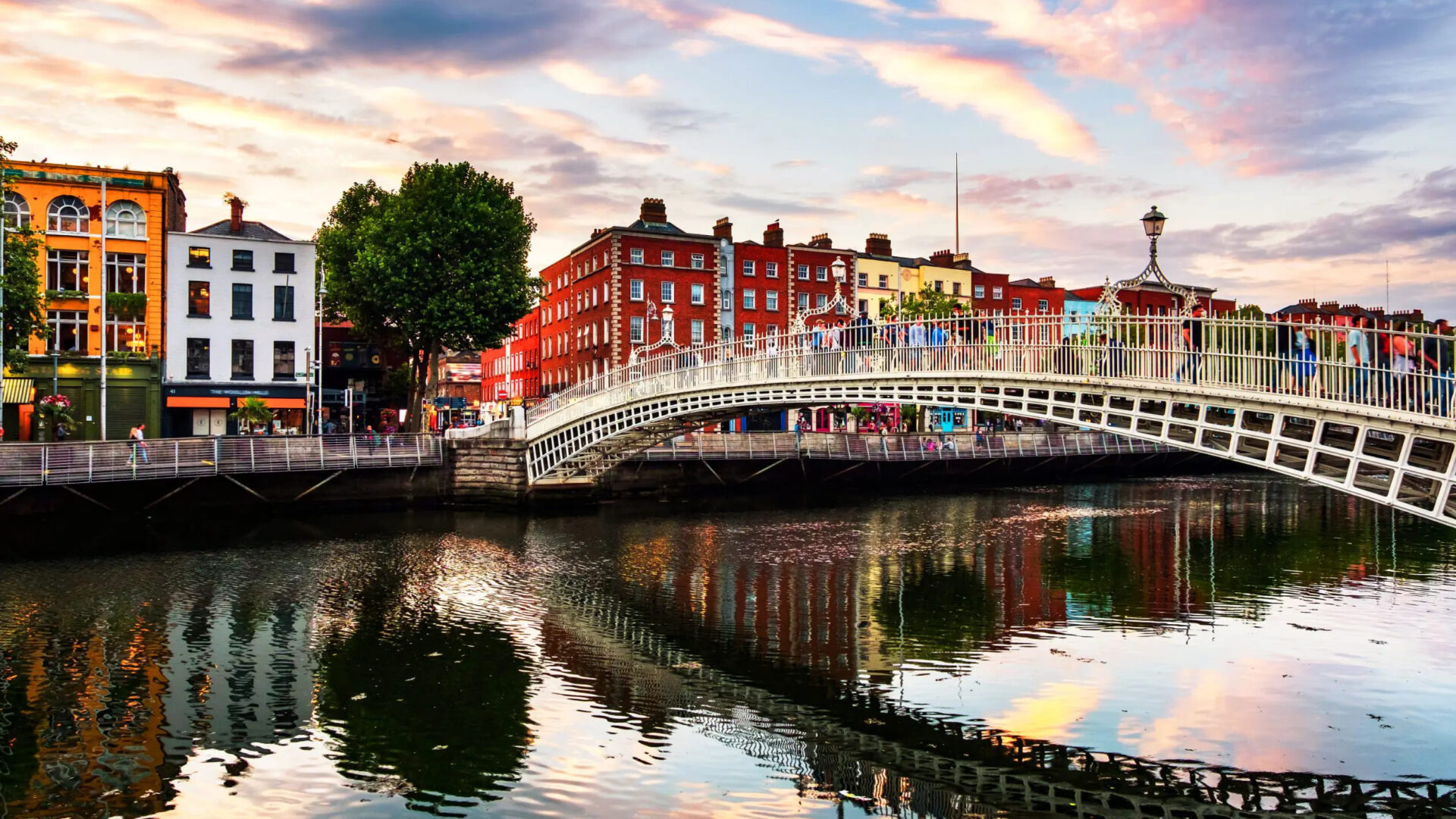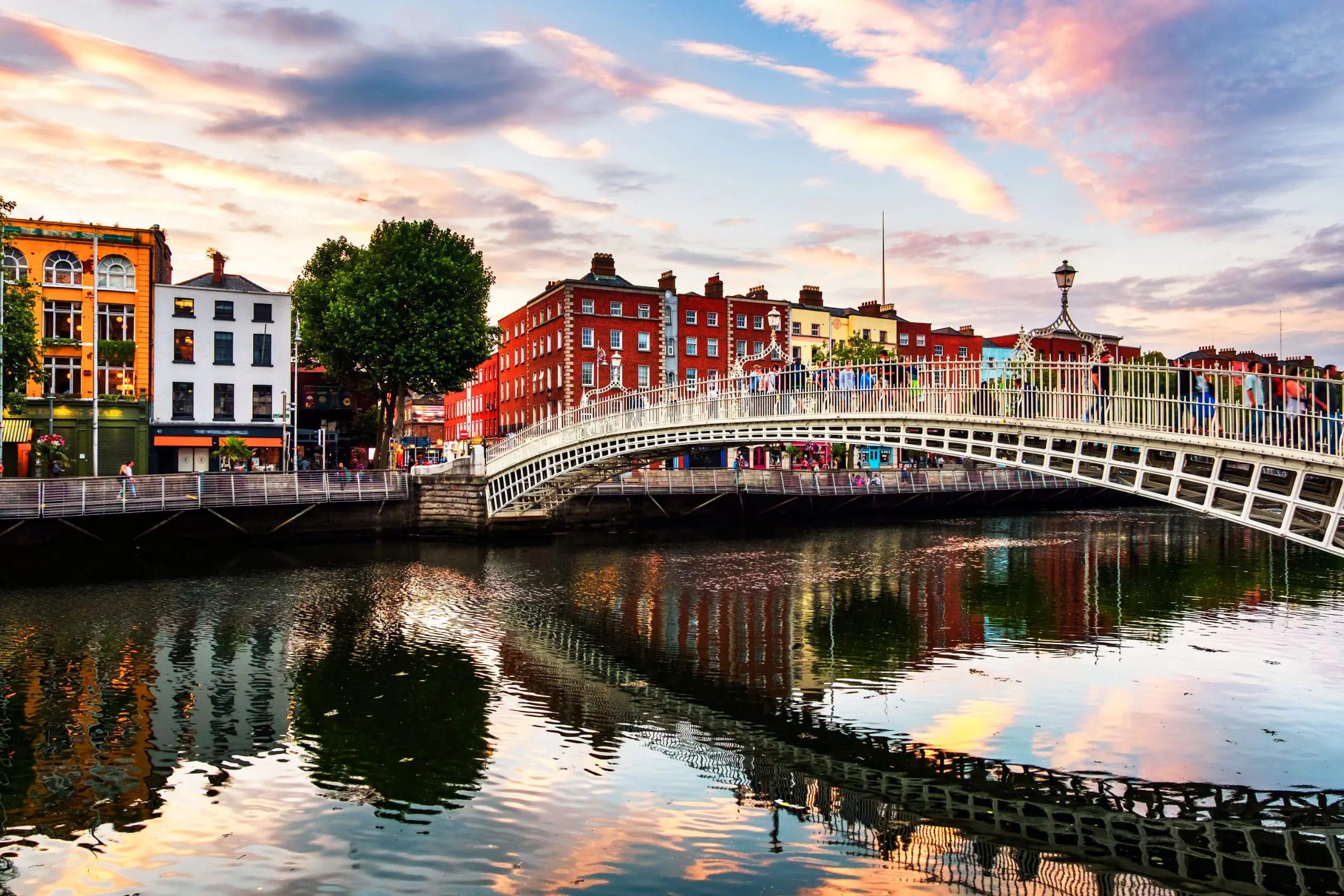
Discover Ireland: Your Travel Guide to Castles, Cliffs & Culture
Explore IRELAND
Discover Ireland: The Emerald Isle of Castles, Cliffs & Culture
Ireland: The Emerald Isle of Castles, Cliffs & Culture
Ireland is a land of rolling green hills, dramatic coastal cliffs, historic castles, and warm hospitality. From the lively streets of Dublin to the rugged beauty of the Wild Atlantic Way, Ireland offers a perfect mix of history, adventure, and charm. Whether you're sipping Guinness in a traditional pub, exploring ancient ruins, or driving through the picturesque countryside, Ireland is a must-visit destination for nature lovers, history buffs, and culture seekers alike. Learn More
Frequently Asked Questions: Ireland
Ireland has a mild, temperate climate year-round, but the best time to visit depends on your plans:
- April–June (Spring): Best for blooming landscapes, longer daylight, and fewer crowds.
- July–August (Summer & Peak Season): Ideal for warm weather, festivals, and vibrant cities.
- September–October (Fall): Great for fewer tourists, autumn foliage, and pleasant weather.
- November–March (Winter & Off-Season): Best for cozy pub nights, lower prices, and festive Christmas markets.
- Cliffs of Moher (County Clare) – Ireland’s most famous natural wonder, offering stunning ocean views.
- Dublin’s Temple Bar & Guinness Storehouse – The heart of Ireland’s nightlife and beer culture.
- Ring of Kerry – A scenic drive through mountains, coastal villages, and breathtaking landscapes.
- Blarney Castle & The Blarney Stone – Kiss the stone and gain the gift of eloquence.
- Giant’s Causeway (Northern Ireland) – A UNESCO-listed natural wonder with hexagonal rock formations.
- Trinity College & The Book of Kells (Dublin) – Home to one of the world’s most famous illuminated manuscripts.
- Kylemore Abbey (Connemara) – A stunning lakeside castle and monastery.
- Galway City – A lively cultural hub with traditional Irish music, colorful streets, and fresh seafood.
- Rock of Cashel (Tipperary) – An ancient fortress with medieval chapels and Celtic history.
- Wild Atlantic Way – A breathtaking coastal route stretching from Donegal to Cork.
- Irish Stew – A hearty dish made with lamb, potatoes, carrots, and onions.
- Boxty – A traditional potato pancake, crispy on the outside and soft inside.
- Full Irish Breakfast – Includes eggs, sausage, black & white pudding, bacon, and soda bread.
- Seafood Chowder – A creamy, flavorful soup filled with fresh seafood.
- Colcannon – A delicious mix of mashed potatoes, cabbage, and butter.
- Soda Bread – A dense, slightly sweet bread served with Irish butter.
- Guinness Pie – A rich beef and vegetable pie slow-cooked with Guinness beer.
- Coddle – A Dublin specialty made with sausage, bacon, onions, and potatoes.
- Baileys Irish Cream – A sweet, creamy liqueur often added to coffee or enjoyed straight.
- Irish Coffee – A perfect blend of whiskey, coffee, sugar, and cream.
- Flights: Arrive at Dublin Airport (DUB), Shannon Airport (SNN), or Cork Airport (ORK).
- Trains: Ireland has a reliable rail system, but some scenic areas are better explored by car.
- Car Rentals: Ideal for driving scenic routes like the Wild Atlantic Way and the Ring of Kerry.
- Buses: A budget-friendly way to travel between cities and smaller towns.
- Taxis & Ride-Hailing Apps: Available in major cities, but rural areas have limited options.
- Ferries: Travel between Ireland and the UK or explore the Aran Islands by boat.
- For U.S. travelers: No visa required for stays up to 90 days, but a valid passport is necessary.
- For international travelers: Check Ireland’s visa requirements based on nationality.
- EU Travelers: Can enter freely with a valid national ID or passport.
- Currency: Euro (€ EUR) in the Republic of Ireland, but Pound Sterling (£ GBP) in Northern Ireland.
- Credit cards are widely accepted, but cash is useful for rural areas and small pubs.
- ATMs are available throughout the country, offering good exchange rates.
- Currency exchange is available at airports, banks, and city centers.
- English is the primary language.
- Irish (Gaelic) is also spoken, especially in Gaeltacht regions, but English is widely understood.
- Common Irish phrases to know:
- Dia duit (Hello)
- Go raibh maith agat (Thank you)
- Sláinte! (Cheers!)
- Pubs are social hubs – Don’t be shy about chatting with locals!
- Tipping is appreciated but not mandatory – 10% is common in restaurants.
- Greet people with a handshake and a smile – Irish people are very friendly.
- Driving is on the left side of the road – Be mindful if renting a car.
- Respect historic sites and nature – Many places have deep cultural and historical significance.
- Pub etiquette – It’s customary to take turns buying rounds of drinks in a group.
- Restaurants: 10% tip is appreciated, but not always expected.
- Bars & Pubs: No need to tip, but rounding up the bill is a kind gesture.
- Hotels: €1–2 per bag for bellhops, €2–5 per night for housekeeping.
- Taxis: Tipping is not required, but rounding up is polite.
- Tour Guides & Excursions: €5–10 per person for excellent service.
- For peak season (June–September & March for St. Patrick’s Day): Book 6–12 months in advance for hotels and flights.
- For off-season travel (October–April): Booking a few weeks ahead is usually fine.
- For major events like St. Patrick’s Day & Galway Races: Book as early as possible.
- No COVID-19 test is required for entry, but check for updates before traveling.
- Some castles and heritage sites require advance booking—check online before visiting.
- Weather changes quickly—always pack a raincoat, even in summer!
Contact us at 281-229-0862 or admin@pointmetoparadise.com
